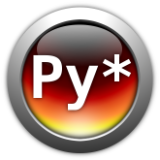
Advice for Organizers
- Join http://groups.google.com/group/pystar to ask for help, and to promote your event
- Connect with your local Python User Groups if possible to network between your workshops
and the local community, encourage participants to attend local events as they move beyond
being new to Python and programming
- Do surveys at your workshops (examples are on the site for Pre & Post) and send that
(anonymized) data back to the PyStar google group to track the impact of these workshops
- Start and keep a mailing list for future events and encourage past participants to come back and teach
Planning Checklist
- Pick date(s) and set the duration and structure of the workshop, for example:
- Single evening, 4hrs, beginners intro to programming
- Friday night install, Saturday all-day workshop, multiple skill levels with various project groups
- Put out a call (or do outreach to your friends and local Python user groups)
for volunteers to teach and assist at the workshop. As much as is possible in your area
try to find female pythonistas & assistants to provide role models for learners
- Find a space to hold the workshop that has internet, and conf rooms or other group seating setup so learning groups can sit together
- Set up an event at www.eventbrite.com (it can be useful to set up two kinds of tickets - both free - one for attendees and one for volunteers)
- Start publicizing the event.
- Let http://groups.google.com/group/pystar and @PyStar_Promo (twitter account) know about the event to help with spreading the word
- Pick your curriculum. Right now the pystar site has some very basic badges that first time programmers can do on the workshop day but different events have used other tools like doing exercises from:
- If you have time, design your own (newbie-friendly) curriculum and then share it back to the
google group (or ask to be added as a collaborator to https://github.com/pystar/pystar).

